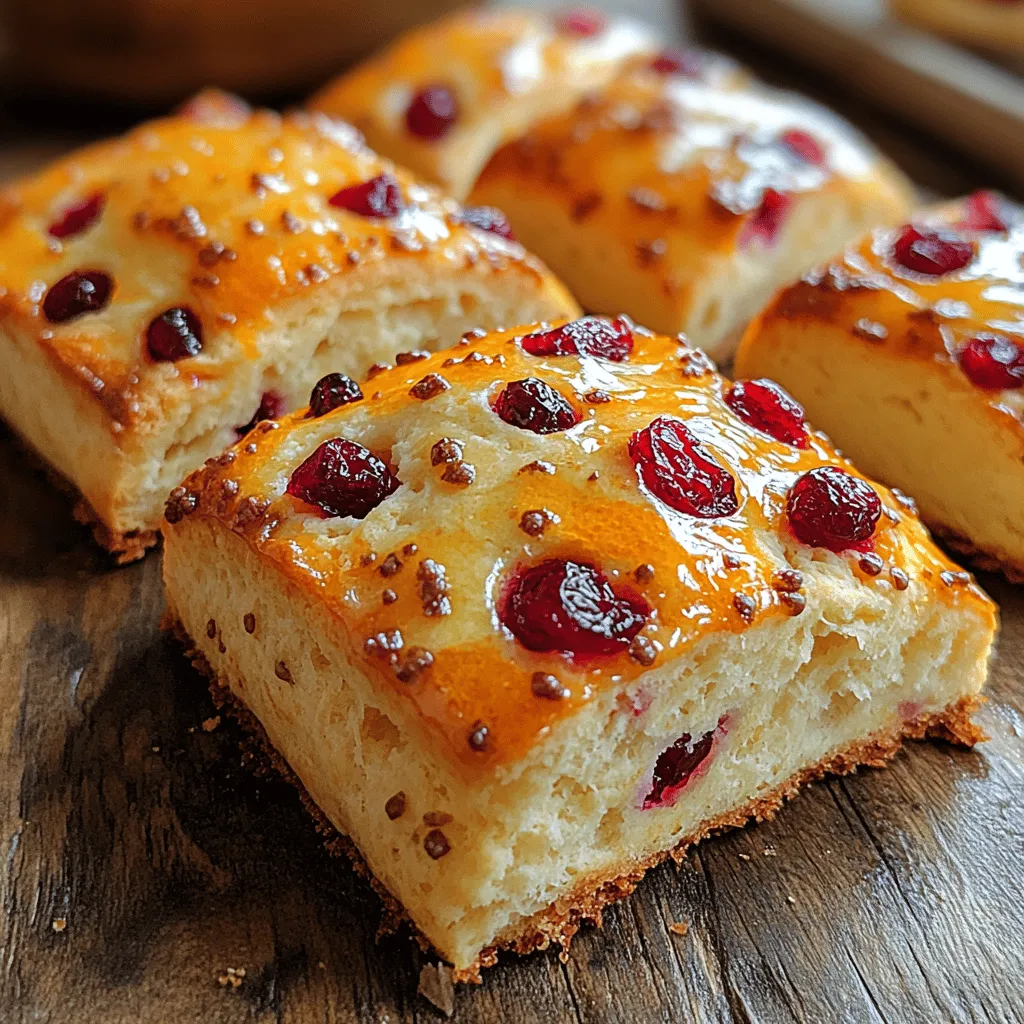Bright Orange Cranberry Scones: A Flavorful Start to Your Day
Scones are more than just a delightful baked good; they are a versatile treat that can elevate any breakfast or afternoon tea. The Bright Orange Cranberry Scones recipe combines the zesty brightness of fresh orange with the tartness of cranberries, creating a perfect balance of flavors that is both uplifting and comforting. These scones are ideal for sharing on a special occasion or enjoying solo with your morning coffee. Their appealing color and inviting aroma will fill your kitchen with warmth, making them a favorite for family and friends.
Scones have a rich history, originating from the British Isles, where they were traditionally served with clotted cream and jam. Over time, they have evolved into various regional variations, each adding its own twist to the classic recipe. Whether enjoyed plain, sweetened, or infused with fruits and spices, scones have become a beloved staple in many households. The light, flaky texture is a hallmark of a well-made scone, distinguishing them from denser baked goods. This recipe specifically focuses on achieving that ideal texture while incorporating tangy cranberries and aromatic orange zest for a refreshing twist.
Understanding Scones
To fully appreciate the art of scone-making, it’s essential to understand their history and the role of texture in crafting the perfect scone. The origins of scones can be traced back to Scotland in the 1500s, where they were made using oats and baked on a griddle. Over the years, the recipe transformed, and by the 19th century, the modern version made with wheat flour began to emerge. Today, scones are cherished not only in the UK but also around the world, with countless recipes and variations available.
Texture plays a crucial role in the scone-making process. A great scone should strike a balance between being light and flaky while avoiding a dry or dense consistency. The secret to achieving this lies in the method of mixing and the quality of ingredients used. Homemade scones are often preferred over store-bought versions because they allow for customization and the use of fresh, high-quality ingredients. When you make scones at home, you can control the flavor, texture, and sweetness, ensuring a perfect batch tailored to your taste.
Ingredient Breakdown
Now that we understand the significance of scones, let’s dive into the specific ingredients that make Bright Orange Cranberry Scones so special.
All-Purpose Flour
The foundation of any scone recipe, all-purpose flour contributes to the structure and texture of the final product. It provides the necessary gluten that, when mixed properly, creates the light and airy texture that scones are known for. Be sure to measure the flour accurately to avoid altering the scone’s consistency.
Granulated Sugar
Granulated sugar is essential for balancing the flavors in the scones. It not only adds sweetness but also enhances the overall taste profile. In this recipe, the sugar complements the tartness of the cranberries and the brightness of the orange zest, creating a harmonious blend of flavors.
Baking Powder
As a leavening agent, baking powder plays a pivotal role in helping scones rise and achieve that desired fluffy texture. It’s important to use fresh baking powder to ensure effective leavening, which will result in light and airy scones.
Salt
While it may seem counterintuitive, salt is a critical ingredient in baking. It enhances the flavors of the other ingredients, making the scone taste more complex and delicious. A pinch of salt in the dough will elevate the overall flavor profile, bringing out the sweetness of the sugar and the brightness of the orange.
Cold Unsalted Butter
Cold unsalted butter is a key player in achieving the perfect flaky layers in scones. When incorporated into the flour, the butter creates small pockets of fat that, when baked, steam and expand, resulting in a tender and flaky texture. It’s essential to keep the butter cold to prevent it from melting before baking.
Dried Cranberries
Dried cranberries add a delightful tartness and chewy texture to the scones. Their vibrant color also enhances the visual appeal of the finished product. Be sure to chop the cranberries into smaller pieces for even distribution throughout the dough.
Fresh Orange Zest
Fresh orange zest is what truly elevates these scones. The natural oils found in the zest infuse the dough with a bright, citrusy flavor that pairs beautifully with the tart cranberries. Using fresh zest rather than bottled extracts will ensure a more vibrant taste.
Buttermilk
Buttermilk is an excellent addition to scone recipes as it adds moisture and tenderness to the dough. The acidity in buttermilk also reacts with baking powder to create a lighter texture, resulting in scones that are soft yet structured.
Eggs
Eggs serve as a binding agent in the dough, helping to hold all the ingredients together while adding richness. They also contribute to the overall flavor, making the scones taste more decadent.
Vanilla Extract
Vanilla extract adds a subtle sweetness and aroma to the scones, enhancing the overall flavor profile. A splash of vanilla can elevate the taste, making the scones even more enjoyable.
Optional Glaze
While the scones are delicious on their own, an optional glaze can add a sweet finishing touch. A simple glaze made from powdered sugar and orange juice can enhance the orange flavor and create an appealing shine.
Preparation Steps in Detail
With the ingredients laid out, it’s time to begin the exciting process of making Bright Orange Cranberry Scones. The first step is to preheat the oven. Proper temperature is crucial for baking, as it ensures that the scones rise correctly and achieve that desirable flaky texture. Preheat your oven to 400°F (200°C) to create an optimal baking environment.
Next, we move on to mixing the dry ingredients. In a large mixing bowl, combine the all-purpose flour, granulated sugar, baking powder, and salt. Whisk these ingredients together until they are evenly distributed. This step is essential, as it ensures that the leavening agent is well incorporated, which will help achieve a consistent rise across all scones.
By understanding the ingredients and preparation steps involved in making Bright Orange Cranberry Scones, you are well on your way to creating a delightful treat that will impress anyone who tries them. As we continue with the recipe, we will delve into how to combine these ingredients and craft the perfect scone dough, so stay tuned for the next part of this delicious journey.
Cutting in Butter: Techniques for Achieving Desired Crumb Texture
Achieving the perfect crumb texture in your Bright Orange Cranberry Scones begins with the butter. Cold butter is crucial for creating a flaky texture, as it helps to create steam during baking, which separates the layers of dough. Here are some effective techniques for cutting in butter:
1. Using a Pastry Cutter: This tool allows you to cut the butter into the flour quickly and evenly. Work in a circular motion until the mixture resembles coarse crumbs.
2. Fork Method: If you don’t have a pastry cutter, a fork can do the job. Simply press the butter into the flour until you achieve the desired consistency.
3. Hands Method: For those who prefer a more tactile approach, use your fingertips to rub the butter into the flour. Be careful not to overwork the mixture; you want small pieces of butter to remain for that flaky texture.
4. Food Processor: If you’re short on time, a food processor can quickly blend the butter and flour together. Pulse until the mixture resembles coarse crumbs, but be cautious not to overmix.
Incorporating Cranberries and Zest: Tips for Even Distribution
Once you’ve achieved that perfect crumb texture, it’s time to incorporate the cranberries and orange zest. Even distribution is key to ensure every bite is bursting with flavor. Follow these steps:
– Dredge in Flour: Before adding the cranberries to the dough, toss them in a small amount of all-purpose flour. This prevents them from sinking to the bottom during baking.
– Gently Fold: When mixing in the cranberries and zest, use a spatula or wooden spoon to gently fold them into the dough. Avoid stirring too vigorously, as this can lead to overmixing and tough scones.
Combining Wet Ingredients: Achieving a Smooth Consistency
Next, you’ll want to combine your wet ingredients—typically buttermilk and egg—in a separate bowl. Here’s how to achieve a smooth consistency:
1. Whisk Thoroughly: Start by whisking the egg in a bowl until it’s well beaten. Then, add the buttermilk and continue whisking until fully combined.
2. Room Temperature Ingredients: For best results, ensure that your buttermilk is at room temperature. This helps the wet mixture blend more smoothly into the dry ingredients without clumping.
Forming the Dough: Handling Tips to Avoid Overmixing
When it comes to forming the dough, the key is to handle it minimally. Overmixing can result in dense scones. Here’s how to create a soft, workable dough:
– Combine Gently: Pour the wet mixture into the bowl of dry ingredients and gently fold with a spatula until just combined. It’s okay if there are a few dry streaks; you want to avoid a homogeneous mixture.
– Use a Light Touch: When you form the dough into a ball, do so lightly. If the dough feels too sticky, sprinkle a little flour on your hands rather than adding more flour to the mixture.
Shaping Scones: Various Methods for Cutting and Presentation
Shaping your scones can be as creative as you want. Here are several methods you can try:
– Traditional Triangles: Pat the dough into a circle about 1-inch thick, then cut it into wedges like a pizza. This classic method results in beautifully rustic scones.
– Round Scones: Roll the dough out and use a biscuit cutter to create uniform rounds. This method gives a more polished appearance.
– Square Scones: Pat the dough into a rectangle and cut into squares for a modern twist. This works well for even baking and can be more efficient.
Applying Egg Wash: How It Affects Appearance and Texture
An egg wash will elevate the appearance of your scones, giving them a beautiful golden-brown color. Here’s how to apply it:
1. Prepare the Wash: Beat one egg with a tablespoon of milk or water to create a smooth egg wash.
2. Brush Gently: Using a pastry brush, lightly coat the tops of the scones with the egg wash. Be careful not to let it drip down the sides, as this can affect how they bake.
Baking Time and Temperature: Understanding Doneness Indicators
Baking your scones correctly is crucial for achieving the right texture. Here’s how to know when they’re done:
– Preheat Your Oven: Ensure your oven is preheated to 400°F (200°C) before baking. A hot oven helps create that initial rise.
– Baking Time: Bake for 15-20 minutes, or until the scones are golden brown on top and firm to the touch. You can also use a toothpick; it should come out clean when inserted into the center.
– Cooling: Allow the scones to cool on a wire rack for a few minutes before serving. This helps maintain their ideal texture.
Preparing and Applying the Optional Glaze: Enhancing Flavor and Presentation
For an extra touch of flavor and a visually appealing finish, consider adding a glaze:
1. Simple Glaze Ingredients: Mix powdered sugar with a few tablespoons of fresh orange juice until you reach a smooth, drizzling consistency.
2. Application: Drizzle the glaze over the cooled scones using a spoon or a piping bag for a more controlled application.
Serving Suggestions
Best Accompaniments for Scones
Bright Orange Cranberry Scones pair wonderfully with a variety of accompaniments:
– Tea or Coffee: A warm cup of tea or a freshly brewed coffee complements the citrus and cranberry flavors beautifully.
– Fruit Preserves: Serve with a side of orange marmalade or cranberry sauce for an added layer of flavor.
Ideas for Serving at Gatherings, Brunch, or as a Snack
These scones are versatile enough for any occasion:
– Brunch: Set a scone platter with various toppings for a delightful brunch spread.
– Afternoon Snack: Enjoy them with a cup of tea for a cozy afternoon break.
Variations on Serving: Warm vs. Room Temperature
Scones are best enjoyed warm, but they can also be served at room temperature. Here are a few tips:
– Warm Scones: Reheat in the oven for a few minutes before serving to refresh their texture.
– Room Temperature: For gatherings, you can prepare them ahead of time. They still taste delicious when served at room temperature.
Storage and Shelf Life
Best Practices for Storing Scones to Maintain Freshness
To keep your Bright Orange Cranberry Scones fresh:
– Airtight Container: Store cooled scones in an airtight container at room temperature. This will help retain moisture and prevent them from drying out.
– Avoid Refrigeration: Refrigerating scones can make them dry and tough. Room temperature is best for maintaining their texture.
Freezing Scones: How to Freeze and Reheat Effectively
If you want to prepare ahead of time, freezing is a great option:
1. Freezing: After baking, let the scones cool completely. Wrap each scone individually in plastic wrap, then place them in a resealable freezer bag.
2. Reheating: To enjoy, simply remove the desired number of scones from the freezer, unwrap, and place them in a preheated oven at 350°F (175°C) for about 10-15 minutes.
Shelf Life of Scones: Understanding When They Are Best Enjoyed
For optimal freshness, consume your scones within 2-3 days. If stored properly, they can last up to a week, but the texture may change over time.
Health Benefits of Key Ingredients
Nutritional Value of Cranberries: Antioxidants and Health Benefits
Cranberries are not only delicious but also packed with health benefits:
– Rich in Antioxidants: Cranberries contain high levels of antioxidants, which may help reduce inflammation and support heart health.
– Vitamin C: They are a great source of Vitamin C, boosting your immune system.
Benefits of Using Buttermilk in Baking: Lower Fat Content and Probiotics
Incorporating buttermilk into your scone recipe offers several advantages:
– Moisture: Buttermilk adds moisture to baked goods, creating a tender crumb.
– Probiotics: It contains beneficial bacteria that can aid digestion.
The Role of Whole Grains in Scone Variations: Options for a Healthier Twist
Consider using whole grain flour for a healthier alternative:
– Whole Wheat Flour: Swap out a portion of all-purpose flour with whole wheat flour to increase fiber content and provide a nuttier flavor.
– Oat Flour: For a gluten-free option, oat flour can be used, adding a unique taste and texture.
Conclusion
Making Bright Orange Cranberry Scones is not just about following a recipe; it’s about embracing the joy of baking and the satisfaction of creating something delicious from scratch. These scones, with their vibrant flavors and delightful texture, are perfect for any occasion, whether it’s a cozy breakfast at home or an elegant brunch with friends.
As you explore this recipe, feel free to experiment with different flavor combinations, such as adding chocolate chips or substituting other fruits. The possibilities are endless, and each variation will bring a new twist to this classic treat.
Homemade baked goods hold a special place in culinary traditions, and there’s nothing quite like the aroma of freshly baked scones wafting through your kitchen. So gather your ingredients, roll up your sleeves, and celebrate the simple pleasures of baking with these Bright Orange Cranberry Scones.


